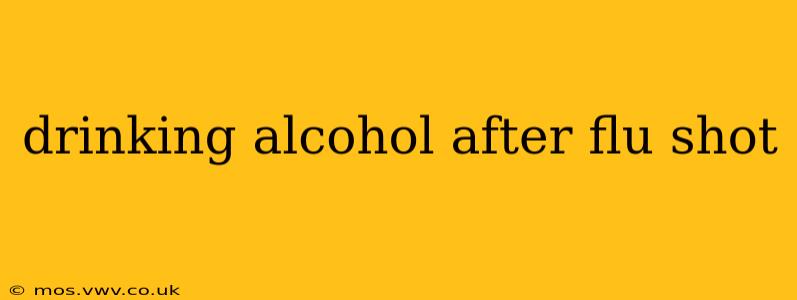The question of whether you should drink alcohol after getting a flu shot is a common one, sparking numerous online searches and conversations. While there's no definitive medical advice stating an outright ban on alcohol consumption post-flu shot, understanding the potential interactions and prioritizing your health is crucial. This article delves into the topic, addressing common concerns and providing clear, evidence-based information.
Does Alcohol Affect the Flu Shot's Effectiveness?
This is the million-dollar question. The short answer is: there's no direct evidence suggesting alcohol consumption significantly reduces the flu vaccine's effectiveness. The flu shot works by stimulating your immune system to produce antibodies against the influenza virus. Alcohol, in moderate amounts, isn't likely to interfere with this process.
However, the nuance lies in the overall impact on your immune system. Excessive alcohol consumption weakens the immune system, making your body potentially less resilient to infections, including the flu itself. While a single drink or two after the shot probably won't significantly hinder its effectiveness, heavy drinking could theoretically reduce your body's ability to mount a robust immune response.
How Much Alcohol is Too Much After a Flu Shot?
There's no magic number. The impact of alcohol on your immune system depends on various factors, including your overall health, the amount you consume, and your body's tolerance. What's considered "moderate" drinking varies, but generally speaking, guidelines suggest limiting alcohol intake to:
- Women: Up to one drink per day.
- Men: Up to two drinks per day.
Exceeding these limits regularly can negatively impact your immune system's functionality. Therefore, while a glass of wine or a beer after your flu shot likely won't cause harm, binge drinking or consistent heavy alcohol consumption should be avoided, particularly in the days following vaccination.
Can Alcohol Make Flu Shot Side Effects Worse?
Some experience mild side effects after the flu shot, such as soreness at the injection site, headache, or muscle aches. Alcohol can potentially exacerbate these symptoms. Alcohol is a known vasodilator, meaning it widens blood vessels. This could potentially increase inflammation and soreness at the injection site. Furthermore, alcohol can worsen headaches and dehydration, which are common post-vaccine side effects.
Should I Avoid Alcohol Completely After My Flu Shot?
The decision is ultimately yours, but prioritizing your well-being is key. Moderation is the key principle here. If you're concerned about potential interactions or experiencing any significant side effects, it's best to err on the side of caution and avoid alcohol. Opt for plenty of rest, hydration (water is best!), and a healthy diet to support your body's immune response.
What if I Already Drank Alcohol After My Flu Shot?
If you've already consumed alcohol after your flu shot, don't panic. As long as it wasn't excessive, it's unlikely to significantly impact the vaccine's efficacy. However, pay attention to your body and any side effects. If you experience concerning symptoms, consult your doctor.
Does the Type of Alcohol Matter?
The type of alcohol (wine, beer, spirits) is less relevant than the overall amount of alcohol consumed. The ethanol in all alcoholic beverages is the primary factor affecting your body.
How Long Should I Wait to Drink Alcohol After a Flu Shot?
There's no specific waiting period. Again, the focus should be on responsible alcohol consumption and prioritizing your overall health. It's not about waiting a certain number of hours or days, but rather making informed decisions regarding your alcohol intake.
In conclusion, while there's no evidence that moderate alcohol consumption directly impacts the flu shot's effectiveness, it's prudent to prioritize your overall health and well-being. Limiting alcohol intake, especially in the days following vaccination, can contribute to a stronger immune response and minimize the potential for experiencing or worsening any side effects. Ultimately, your health is the top priority.
